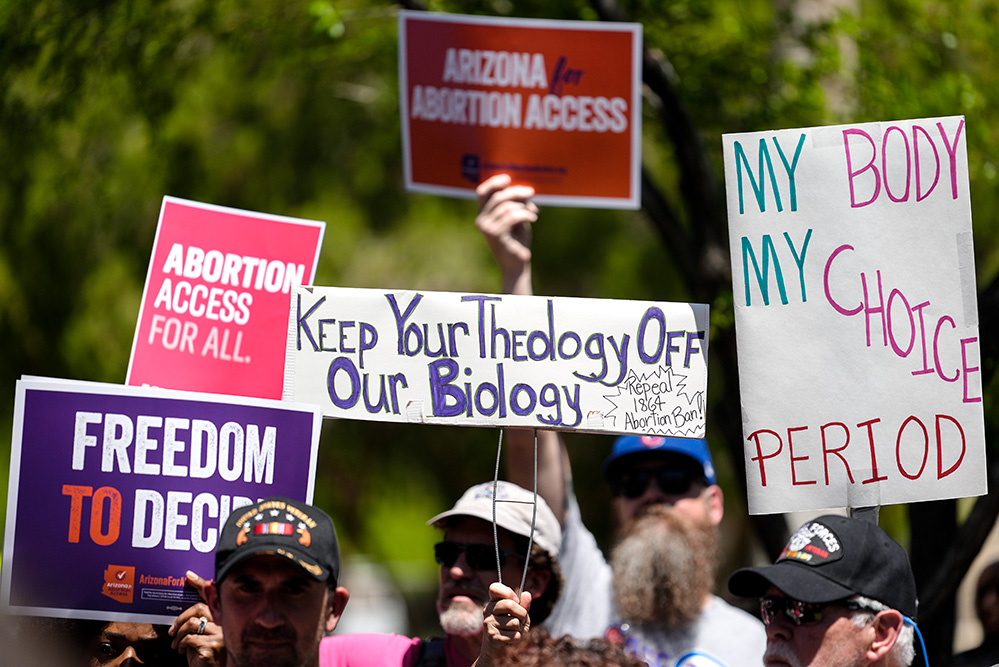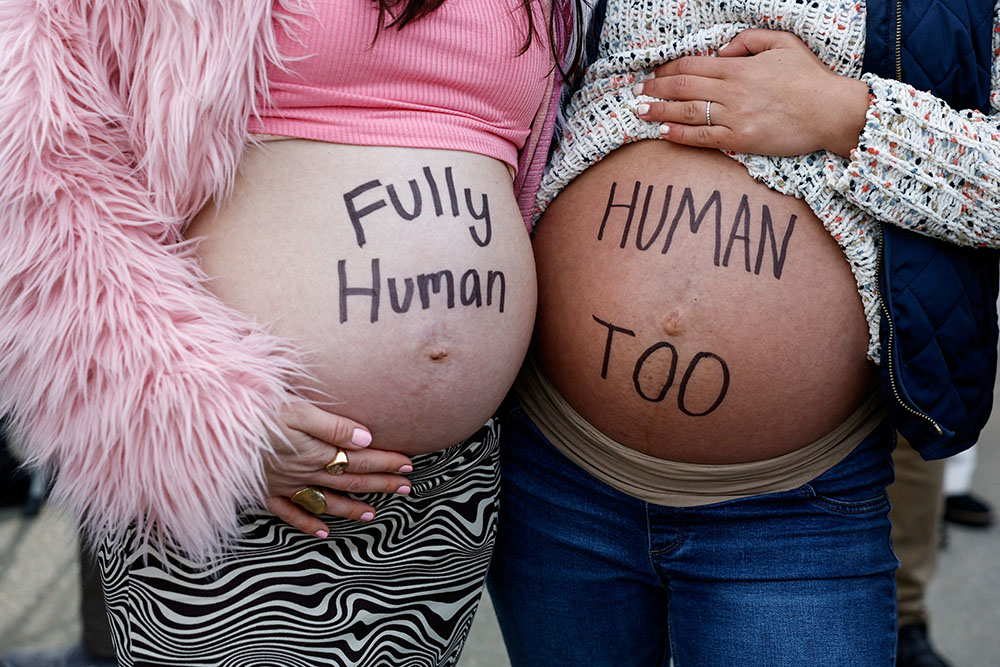
Abortion rights supporters gather April 17 outside the Arizona State Capitol in Phoenix. (AP/Matt York, File)
When Catholics talk about "one-issue voters," no one has to explain what the one issue is.
Opposition to legalized abortion is the church's "preeminent" issue, according to the U.S. bishops' conference. It's what moved the Catholic vote from being a solidly Democratic block throughout much of the 20th century toward affinity with the GOP, which has courted anti-abortion religious voters since the 1980s.
Now the so-called "Catholic vote" is evenly split, mirroring the electorate as a whole. And while abortion is still cited as a motivator, it's clear that other issues are at play for Catholic voters, especially in the wake of the U.S. Supreme Court decision that overturned Roe v. Wade in 2022.
In a recent poll of Catholic voters in seven swing states, abortion and reproductive rights ranked eighth in a list of important issues in this election — after the economy, immigration, health care and taxes, but also after affordable housing and gun control and others.
Only 37% of respondents overall said abortion and reproductive rights were among the important issues they were considering this election. When asked if there was a "deal-breaker" issue that was so important they wouldn't vote for a candidate who did not align with their views, only 17% cited abortion or reproductive rights.
A majority also said abortion should be legal in all or most cases.
The poll, conducted by the National Catholic Reporter, surveyed 1,172 Catholic voters in Arizona, Georgia, Michigan, Nevada, North Carolina, Pennsylvania and Wisconsin Oct. 3-8. The overall margin of error is plus or minus 2.86%.
Given how the questions were phrased, respondents who selected "abortion/reproductive rights" could have been on either side of that issue. In another series of questions, the poll found that Catholic voters said they were more likely to support their preferred candidate for reasons that go against church teaching, whether Harris' views on reproductive rights or Trump's anti-immigration policies.
Yet 87% of respondents said their Catholic identity was very or somewhat important to them. Does this mean all Catholics have become "cafeteria Catholics," who pick and choose which teachings to follow? Does a voter's Catholic faith even matter at the ballot box?
"It isn't accurate to say being Catholic doesn't matter," said Luis Fraga, professor of political science and of transformative Latino leadership at the University of Notre Dame, where he also directs the Institute for Latino Studies.

Pregnant, pro-life women attend a demonstration outside the U.S. Supreme Court in Washington March 26. (OSV News/Reuters/Evelyn Hockstein)
"If they're still identifying as Catholic, that has to mean something," he said. "But being Catholic doesn't mean the same thing to everyone who identifies as Catholic."
Fraga believes Catholic voters take their faith seriously, but also have to reconcile their religious beliefs and church teaching with their other views and values when it comes to making voting decisions.
"In the political realm, where there are many different issues to consider, being Catholic requires making some complex judgements, balancing your religious views with your ideology and partisan views," says Fraga.
The result is that there is no longer a unified "Catholic vote," a reality especially evident along racial lines. In the NCR poll, white Catholics favored Trump by 16 percentage points, while nearly seven out of 10 Hispanic Catholics and more than three quarters of Black Catholics supported Harris.
Anthea Butler, a University of Pennsylvania professor and MSNBC commentator, believes "white identity politics" are at work when analyzing the Catholic vote — especially the white Catholic vote.
"They are assuming a political identity more than a Catholic identity," said Butler, who is involved in Catholic outreach for the Harris campaign. "People always want to pin it on abortion. I do think white Catholics care about abortion. But I think they care about racial issues and other issues more."
Some of the racial discrepancy might also be explained by the shift in who identifies as Catholic, says E.J. Dionne, a political columnist at The Washington Post and professor at Georgetown University.
"I think some of the decline in the Democratic vote among White Catholics is explained by the fact that many younger people who were raised Catholic and are progressive no longer identify with the Church," Dionne told NCR via email. "They don't turn up as 'Catholic' in the polls because they no longer call themselves Catholic."
The NCR poll found that Catholics of color were more likely to believe abortion should be legal in all or most cases. But even among white Catholics, a majority (55%) favored legal abortion. A smaller number, 51% overall, considered themselves to be "pro-life."
"We're learning something that has been becoming clear for a long time now: The Catholic electorate mostly looks like the rest of the electorate," said Steven Millies, professor of public theology at Catholic Theological Union in Chicago, where he also directs the Bernardin Center.
"Catholic Republicans are Republicans and Catholic Democrats are Democrats," he said.
A political strategy that prioritizes abortion above all other issues has contributed to polarization in the church and country, Millies said. The NCR poll "confirms the injury it's done to the church as an ecclesial community."
"Abortion politics have deprived us of the serious moral language that the consistent ethic tries to give us," said Millies, who recently wrote a book on the consistent ethic of life, which connects all issues related to human dignity.
Advertisement
Calling abortion "preeminent" leaves any other threat to human life lumped in as "other issues, unnamed," said Millies. That has not only affected how Catholics vote, but has changed views about Catholic activism and episcopal authority, he said.
Another closely watched trend has been a slight shift in the Latino vote toward the Republican Party. Fraga said it's important to note the context of continuing Democratic support from Latino and African American voters.
"An overwhelming majority of Latinos still support the Democratic candidate in the presidential race," Fraga said. "It's just that it's a smaller overwhelming majority."
Dionne also noted that among U.S. Hispanics, Catholics are considerably more Democratic than those who identify as Protestant or evangelical.
The assumption has been that Latino voters moving toward the GOP are doing so over culture war issues, such as abortion. Yet the NCR poll found that Hispanic Catholics were more progressive than white Catholics on abortion rights, LGBTQ issues and racial justice. They were slightly less likely than white Catholics to identify themselves as pro-life and more likely to include other justice issues in that designation.
Previous polls have found majorities of Latino Catholics oppose legalized abortion. "However, that doesn't mean that's why they vote the way they do," says Fraga of Notre Dame. "It's a separate question. They have higher opposition to abortion, but it's not necessarily determinative of their vote."
This election has also surfaced a record-high gender gap, with women favoring Harris and men opting for Trump. Although the overall gender gap in the NCR poll was slight, it was more significant among Latinos and African Americans.
Across racial categories, women were less likely to identify as pro-life than men, and were more likely to say abortion should be legal in all or most cases. So were the youngest respondents, ages 18-25. That age bracket also went for Harris, by seven points.
That surprised J. Miles Coleman of the Center for Politics at the University of Virginia. His observation, as a Catholic himself, is that younger Catholics tend to be more conservative and have more populist views.
"Especially for Gen Z voters, on the Republican side, they've never known anyone other than Trump as the head of the party," he said. "He's been the Republican nominee in the last three elections."








